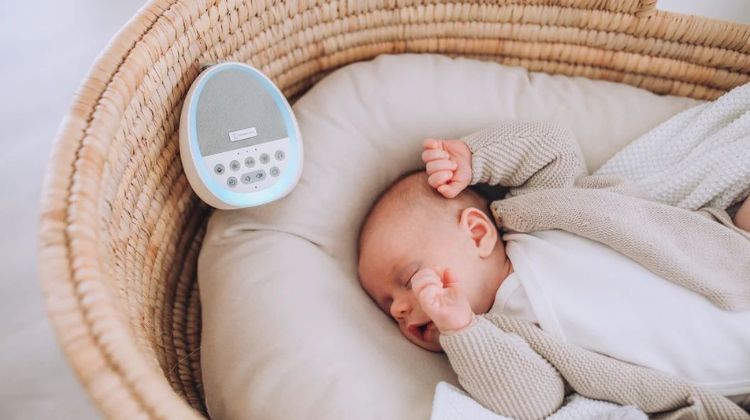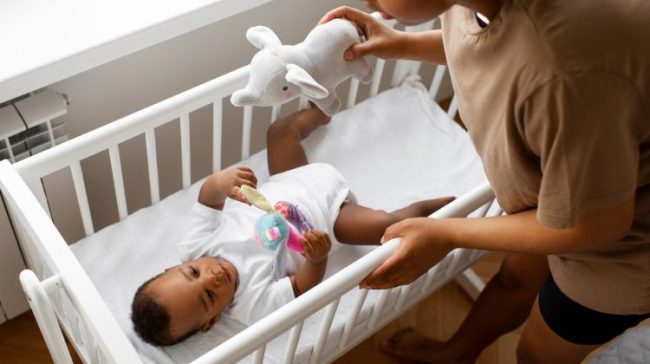Welcoming a new addition to the family is undoubtedly one of life’s most joyous moments. As parents embark on the journey of nurturing their newborn, ensuring a peaceful and comfortable environment is paramount. White noise machines have emerged as a valuable tool for promoting better sleep and relaxation in infants.

In this comprehensive article, we delve into the various benefits of white noise machines for babies, exploring their impact on sleep quality, cognitive development, and overall well-being.
Understanding White Noise
Before delving into the benefits, it’s essential to understand the concept of white noise. White noise is a consistent, evenly distributed sound that spans a broad range of frequencies, effectively drowning out other ambient sounds. The term “white noise” is derived from white light, which contains all the colors in the visible spectrum. Similarly, white noise encompasses all audible frequencies.
White noise machines produce a constant hum that masks disruptive noises, creating a consistent background sound. This can be particularly beneficial in environments with unpredictable or intermittent noises, providing a sense of continuity for the baby.
Benefits of White Noise Machines for Babies
1. Promoting Sound Sleep
One of the primary benefits of white noise machines for babies is their ability to promote sound and uninterrupted sleep. Newborns are highly sensitive to environmental sounds, and sudden noises can disrupt their sleep cycles, leading to irritability and sleep deprivation for both the baby and parents.
White noise acts as a sleep aid by creating a soothing and constant background noise that helps mask abrupt sounds, such as door slams, traffic, or household activities. The gentle hum of white noise provides a consistent auditory environment, reducing the likelihood of disturbances that could wake the baby.
2. Improved Sleep Patterns
Beyond aiding in uninterrupted sleep, white noise machines have been shown to contribute to the establishment of more regular and predictable sleep patterns in infants. Babies thrive on routine, and the consistent background noise provided by white noise machines can help signal the brain that it’s time to sleep.
The rhythmic sound of white noise serves as a sleep cue for babies, helping them transition from wakefulness to sleep more easily. By creating a familiar auditory environment, white noise machines contribute to the development of healthy sleep habits, which can be especially beneficial in the long run.
3. Calming Effect on Fussy Babies
Newborns often experience periods of fussiness, which can be challenging for both parents and the baby. White noise machines have been found to have a calming effect on fussy infants, helping them relax and settle down.
The gentle and consistent sound of white noise mimics the comforting environment of the womb, providing a sense of security for the baby. This soothing effect can be particularly helpful during colicky episodes or when the baby is agitated, offering parents a valuable tool to comfort their little ones.
Read Also: How to Calm a Fussy Baby?
4. Reducing Stress and Anxiety
Babies are highly receptive to their surroundings, and exposure to sudden or loud noises can trigger stress and anxiety. White noise machines create a consistent background sound that helps mask potentially stressful noises, creating a more serene environment for the baby.
Reducing stress and anxiety in infants is not only beneficial for their immediate well-being but also contributes to the development of a more resilient and emotionally stable child. The calming properties of white noise can be especially valuable in households with multiple occupants or in urban environments with high levels of ambient noise.
5. Enhancing Cognitive Development
Adequate and quality sleep is crucial for cognitive development in infants. White noise machines play a role in fostering an environment conducive to better sleep, indirectly contributing to cognitive development.
By promoting longer and more restful sleep, white noise machines support the consolidation of memories, learning, and overall brain development in infants. Studies have shown that infants who experience regular, uninterrupted sleep may exhibit better cognitive performance as they grow older.
6. Creating a Sleep Association
White noise machines can serve as a powerful sleep association tool for babies. Sleep associations are cues or rituals that help signal to the baby that it’s time to sleep. The consistent sound of white noise becomes associated with sleep, making it easier for babies to transition into a restful state when the machine is activated.
Over time, the baby learns to recognize the white noise as a precursor to sleep, facilitating a smoother bedtime routine. This association can be particularly helpful for parents aiming to establish a predictable and calming bedtime routine for their infants.
7. Versatility in Use
White noise machines offer versatility in terms of where and how they can be used. Portable and compact designs allow parents to bring the benefits of white noise wherever they go, making it a valuable tool for travel or maintaining a consistent sleep environment outside the home.
Whether in the nursery, during car rides, or in a stroller, white noise machines can help recreate the familiar and soothing sound environment that contributes to the baby’s well-being. This versatility makes them a practical and accessible solution for parents seeking to provide a comforting atmosphere for their infants.
8. Creating a Consistent Sleep Environment
Consistency is key when it comes to establishing healthy sleep habits for babies. White noise machines contribute to creating a consistent sleep environment by masking external noises and providing a constant auditory backdrop for sleep.
In households with varying levels of noise, such as those with older siblings or pets, white noise machines help maintain a stable sleep environment. This consistency is essential for the baby’s ability to self-soothe and fall asleep independently, fostering a sense of security and predictability.
9. Addressing Sleep Transition Challenges
Babies experience various sleep transitions as they grow, from shorter naps to longer periods of nighttime sleep. These transitions can sometimes pose challenges as infants adapt to changing sleep patterns. White noise machines can be particularly beneficial during these transitions.
The continuous sound of white noise helps smooth out the transitions between sleep cycles, reducing the likelihood of the baby waking up prematurely. This can be especially helpful during the transition from lighter to deeper sleep stages, ensuring a more restful and extended sleep experience for the infant.
Potential Drawbacks and Considerations
While white noise machines offer numerous benefits, it’s important for parents to be aware of potential drawbacks and exercise caution in their use:
- Volume Control: Excessive volume levels can potentially harm a baby’s hearing. It’s crucial to use white noise machines at a safe and moderate volume, keeping in mind the sensitivity of a baby’s ears.
- Dependency: Some parents express concerns about creating a dependency on white noise for sleep. To mitigate this, it’s advisable to use white noise as one component of a comprehensive bedtime routine rather than the sole sleep aid.
- Quality of Sound: Not all white noise machines are created equal. Investing in a high-quality machine that produces a consistent and gentle sound is essential for reaping the full benefits. Poorly designed machines may produce irritating or inconsistent sounds that could be counterproductive.
- Monitoring Sleep Duration: While white noise machines can contribute to longer and more restful sleep, it’s essential for parents to monitor their baby’s overall sleep duration and consult with healthcare professionals if concerns arise.
Final Thoughts
In conclusion, white noise machines can offer numerous benefits for babies, from improved sleep to reduced stress and increased focus. It is important to choose a high-quality, safe and age-appropriate white noise machine for your child. Remember to always use the machine in moderation and consult with your child’s paediatrician before incorporating it into their sleep routine. However, with proper use, it can be a valuable addition to a baby’s sleep routine.



